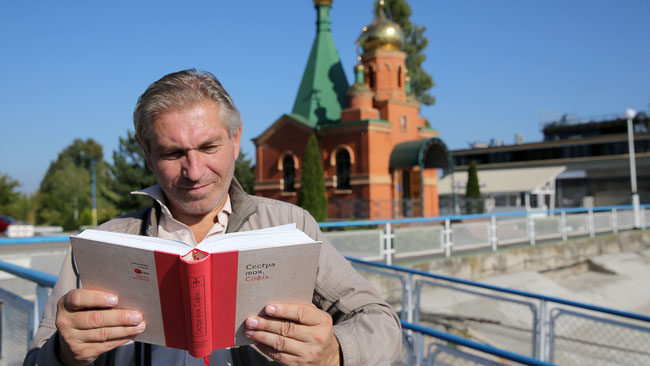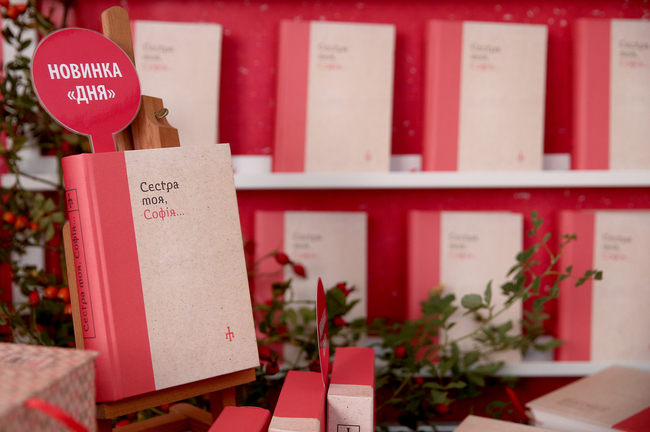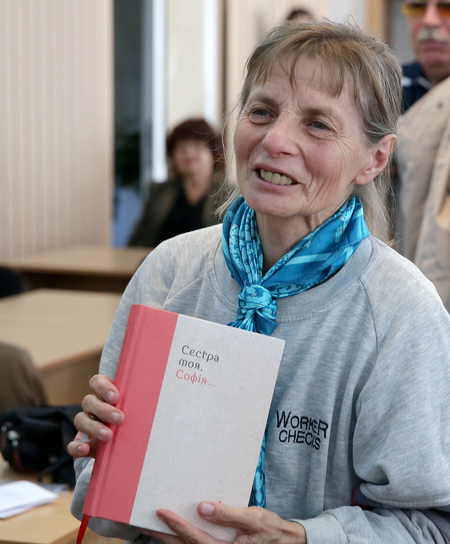“A justified and correct parallel”
Residents of Izmail and Bolhrad saw our new book My Sister Sofia..., the first to do so after visitors of the Publishers’ Forum in Lviv
Two cities in southern Odesa region hosted launches of the newest addition to Den’s Library series, the book My Sister Sofia..., on the same day, September 30. On behalf of the editor-in-chief Larysa Ivshyna, the book was introduced by its compiler and editor of the newspaper’s history section Ihor Siundiukov and one of the contributors, Doctor of Sciences in History Volodymyr Rychka. In addition, the book launch was the first event of the Danubian Sich festival.
The first meeting was held in Izmail State Humanitarian University, where Den’s men met not only students and faculty members, but also civic activists, local journalists, and ethnic Bulgarians living in the area.
Moderator of the event and chairman of the Charitable Foundation in Support of the Newspaper Den’s Initiatives Mykola Hrytsenko stressed that books from Den’s Library raised cultural issues which the government ignored: “The root cause of many of our ills is ignorance and illiteracy. What is happening in the Donbas started due to, above all, people’s ignorance of their history and their place in it. The value of My Sister Sofia... lies in the fact that it was created by modern Ukrainian historians. They open once closed archives and find once inaccessible sources. The book deals with a large layer of history, ranging from antiquity to the present. With this book, Den tries to bring Bulgaria and Ukraine closer to one another.”
The relationship between our two countries, particularly in the Kyivan Rus’ era, was covered by Rychka in his speech: “From Byzantine and our own sources, we know that Prince Sviatoslav the Brave was a born conqueror. The rulers of Constantinople managed to seduce Sviatoslav by a tempting prospect of militarily subduing the Balkans. They signed an agreement under which the Rus’ troops moved against the Bulgarians. Sviatoslav conquered almost the entirety of eastern Bulgaria during his first campaign. Incidentally, he was often criticized for saying: ‘I do not care to remain in Kyiv, but should prefer to live on the Danube, since that will be the center of my realm.’ But now, of course, it is not military, but rather cultural expansion, which we should strive for.”

Photo by Ruslan KANIUKA, The Day
Today our people have something to learn from each other, Siundiukov believes: “Here is one example. One of the central subway stations in the Bulgarian capital Sofia is named after Clement of Ohrid, just like Sofia State University. It is as if the largest central subway station in Kyiv was named after Nestor the Chronicler. Unfortunately, the latter is difficult to imagine. This shows modern Bulgaria’s attitude to national culture.”
“I REALLY WANT TO THANK YOU FOR BREAKING ‘UNBREAKABLE’ STEREOTYPES”
The audience listened attentively and actively participated in the conversation. The prize for the best question went to a listener who received a free copy of My Sister Sofia... The lucky winner was Natalia Kacheva who is married to a Bulgarian and teaches Ukrainian language and literature at a school. Kacheva thanked Den for the work it carries out to debunk false parallels between Bulgaria and Russia and establish a connection with the history of our country: “I really want to thank your newspaper and all its employees for breaking these ‘unbreakable’ stereotypes. I am not against the Russian people, but we have to say the truth, after all. I recently perused a book published by the Moscow Patriarchate which is full of stories about ‘Russian’ princes including Princess Olha and Prince Ihor. The Bulgaria-Russia parallel is the background behind the idea to create the so-called ‘People’s Republic of Bessarabia.’ Here, though, we see the very important Bulgaria-Ukraine parallel shown for the first time, which is a new, justified and historically correct idea. I offer my thanks on behalf of Bulgarians and Ukrainians for raising the issue in a timely manner.”
“Odesa region and in particular Izmail sub-region is a unique area. There is a national polyphony here. Actually, both my grandmothers were Bulgarian. We have no ethnic clashes or conflicts. Romanians, Bulgarians, and Ukrainians share in cultural achievements. Such cooperation takes nothing from the Ukrainian culture, but enriches it instead. If a person learns another language, another culture, gets to know its major figures, it enriches their own culture,” we heard from Nadia Osmocescu, a sixth-year student of Izmail State Humanitarian University. “It is important that Den carries out this work... It greatly benefits students who study Bulgarian culture, because not many books have been written on the subject. Most of them were published back in the Soviet era, so publishing latest research is totally appropriate.”
“OUR STUDENTS WILL ESPECIALLY BENEFIT FROM IT”
Den’s team then visited the city of Bolhrad, one of the largest Bulgarian communities in southern Ukraine. The book launch provoked a debate there, particularly on what can be considered the starting point in the Ukrainian-Bulgarian relations. “The questions voiced during the meeting by members of our community were mostly due to the fact that we have many historical links with the territory of present Bulgaria, as the first settlers here were people who once migrated from Bulgarian territory,” said Oleksandr Milkov, chairman of the community council at the raion state administration. “Many cultural links are still there. Quite a few of our children study at Bulgarian universities and receive EU-compliant diplomas. While I am not familiar in detail with the content of the book, I am sure it will be interesting to read.” Another copy of the book was awarded as the prize for the best question to history teacher from Bolhrad Maria Chebanova. (By the way, she once taught Den’s politics section editor Ivan Kapsamun.)

Photo by Artem SLIPACHUK, The Day
“Your visit to the city of Bolhrad is timely in an environment where people have not yet fully decided on their beliefs and attitudes. Such meetings are necessary to shape people’s worldviews. They allow one to determine where they stand,” Chebanova believes. “This is especially important for the periphery. After all, the capital city offers better opportunities to draw the lines linking the past and the present, while we have few of them. Of course, the Internet has reached here, and we use it, but live communication is more important. Many thanks to Den for coming to visit us. I have not perused the book yet, but I can say at once that I like its binding and quality of paper on which it is printed. The content of this book will be valuable to us.”
Tetiana Adamova, director of the municipal institution Bolhrad Regional Centralized Library System, was sure that My Sister Sofia... would benefit young people: “I believe that our library is lucky to have such a book in our collection. It will be especially useful for our students who write historical essays for the Minor Academy of Sciences competitions. I like My Sister Sofia... most for the fact that it contains compact information on the history of Bulgaria from antiquity to the present day.”
Newspaper output №:
№57, (2016)Section
Culture





